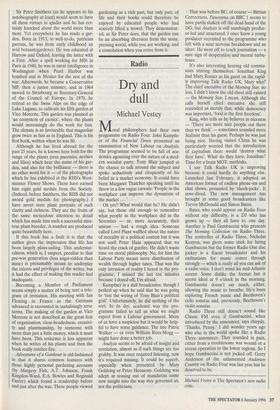Radio
Dry and dull
Michael Vestey
Moral philosophers had their own programme on Radio Four. John Kampfn- er of the Financial Times presented an examination of New Labour on Analysis. The programme seemed to be full of aca- demics agonising over the nature of a mod- ern socialist party. Tony Blair jumped at the chance to talk around the subject and spoke seductively and eloquently of his belief in a market economy. It could have been Margaret Thatcher speaking until he threw in a few vague caveats: 'People in the workplace can improve the dynamism of the market ... '
Oh yes? What would that be? He didn't say, but those old enough to remember what people in the workplace did in the Seventies — or, more accurately, their unions — had a rough idea. Someone called Lord Plant waffled about the nature of morality in a political context but it was not until Peter Hain appeared that we heard the crack of gunfire. He didn't waste time on moral philosophy. No, for him the Labour Party meant more distribution of wealth through higher taxes. That was the only intrusion of reality I heard in the pro- gramme. I missed the last ten minutes because I dozed off, I'm afraid.
Kampfner is a dull broadcaster, though I perked up when he said that he was going to 'test the wiring of Tony Blair's political grid'. Unfortunately, he did nothing of the sort. In its dry, academic way the pro- gramme failed to tell us what we might expect from a Labour government. Many of us have a suspicion but it would be help- ful to have some guidance. The late Patric Walker — or even William Rees-Mogg might have done a better job.
Analysis seems to be afraid of insight and revelation, almost as if such things are too grubby. It was once required listening, now it's required missing. It could be superb, especially when presented by Mary Goldring or Peter Hennessy. Goldring was adept at teasing out of mandarins some new insight into the way they governed us, not the politicians. That was before BC, of course — Birtian Correctness. Panorama on BBC 1 seems to have partly shaken off the dead hand of the DG, but Analysis is still numbingly produc- er-led and structured. I once knew a young producer recruited to the programme who left with a near nervous breakdown and an ulcer. He went off to teach journalism — a sure sign of desperation and mental turbu- lence.
It's also interesting hearing old commu- nists stirring themselves. Jonathan King had Mary Rosser as his guest on the rapid- ly improving Talk Radio UK. Mary who? The chief executive of the Morning Star, no less. I didn't know the old sheet still existed — the Morning Star, I mean. Although she calls herself chief executive she still reminded us sternly that, while democracy was important, 'food is the first freedom'.
King, who tells us he believes in niceness — 'There are more nice people out there than we think' — sometimes sounded more Stalinist than his guest. Perhaps he was just being nice. Having visited China he was particularly worried that the introduction of capitalism there would 'destroy what they have'. What do they have, Jonathan? Time for a brain MOT, methinks.
I say Talk Radio UK is improving because it could hardly do anything else. Launched last February, it adopted an American format of endless phone-ins and chat shows, presented by `shock jocks'. It nose-dived. The new management has brought in some good broadcasters like Trevor McDonald and Simon Bates.
Bates, who could appear on Radio Four without any difficulty, is a DJ who has grown up — they all have to, one day. Another is Paul Gambaccini who presents The Morning Collection on Radio Three. The controller of Radio Three, Nicholas Kenyon, was given some stick for hiring Gambaccini but the former Radio One disc jockey is a fluent broadcaster and his enthusiasm for music comes through strongly — which is really all you can ask of a radio voice. I don't mind his mid-Atlantic accent. Some dislike the format but it seems ideal at 9 o'clock in the morning. Gambaccini doesn't say much, either, allowing the music to breathe. He's been exploring French music and Beethoven's cello sonatas and, previously, Beethoven's violin sonatas.
Radio Three still doesn't sound like Classic FM even if Gambaccini, when introduced by the announcer, says chirpily, `Thanks, Penny.' I did wonder years ago who else in the world spoke like a Radio Three announcer. They sounded in pain, either from a troublesome war wound or a recent operation to the lower regions. So I hope Gambaccini is not jocked off. Gerry Anderson of the unlamented Anderson Country on Radio Four was last year but he deserved to be.
Michael Vestey is The Spectator's new radio critic.


















































 Previous page
Previous page